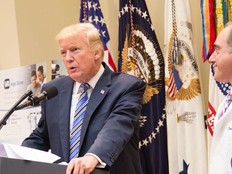Energy Department: Smartphone Chargers Consuming Too Much Energy
A swift, expensive increase in demand on the nation's energy supply has prompted the Department of Energy (DOE) to place new standards on chargers for smartphones.
The new standards are part of an initiative to reduce overall energy waste, and they target phone chargers as well as other external power supplies.
By enacting tougher restrictions on the energy consumed by phones, computers, video game consoles and more, the DOE estimates that it could save American consumers nearly $4 billion over 30 years. Those savings are paired with a carbon-emissions reduction of 47 million metric tons over the same period.
In evaluating the possible costs to retailers and manufacturers, the DOE concluded its decisions "represent the maximum improvement in energy efficiency that is technologically feasible and economically justified, and would result in significant conservation of energy."
More Devices, More Energy Requirements
On average, a phone charger consumes 2.24 watts when attached to a charged phone. Consumption increases to 3.68 watts when a phone is actively charging and decreases to 0.26 watts without a phone attached.
Those numbers aren't incredibly high when taken alone; in other words, no household is going bankrupt because of idle chargers. It's when the overall electronic ecosystem is considered that the picture becomes clearer. According to a recent survey from the Consumer Electronics Association, the average household owns 28 devices.
That figure marks a 16.6 percent increase from 2012, which has been driven largely by the rise of tablet ownership (up 17 percent) and smartphones (up 12 percent).
And as technology iterates, so do the power requirements. For example, the latest duo of video game consoles, the PlayStation 4 and Xbox One, have been well praised for their emphasis on energy efficiency.
But each still consumes significantly more energy than their predecessors. And along with a slew of updates to the suite of offerings in its mobile operating system, Apple's iOS 7 update has had a negative impact on the battery life of many devices, requiring more stops to recharge.
Beyond the new standards, the DOE recommends that households follow smart energy practices ranging from unplugging devices when they're not in use to employing sleep modes to making more energy-conscious decisions when buying devices.
The new regulations will be effective starting April 11, 2014, and compliance with the standards will be required by Feb. 10, 2016.
For more of the technical specifications of the new standards, from the exact devices affected to the exemptions for small businesses, check out the DOE's full report.








